Design Diary 2: Creating The PDF
This is part 2 of design diaries about Abdec's development. Check out the whole series here.
In the first design diary I covered my game design path up until Abdec - how I learned a lot through creating my first puzzle book Lineon and then LOK. LOK's lesson was that I needed to transform rule-learning into a part of the game itself, to stay true to my goal of creating responsive modern game experiences, so this was my design philosophy going forward as well.
When I started making LOK, I wasn't aware of any other physical games co-existing in a similar design space, but during the development people repeatedly pointed out two games: The Witless by William "TheGreatEscaper" Hu and FMTC by the late Jack Lance. Both are fantastic sets of paper puzzles that don't teach you any rules explicitly, but instead want the solver to deduce them from the given problems. The way they achieve this goal is different from how I taught new rules in LOK - LOK has the ultimate rule that you must always black out all cells in the grid and this is the confirmer you use to wiggle out new mechanics and keywords.
The Witless and FMTC on the other hand rely on the simple premise that every puzzle must has a unique solution. Since the rules are consistent between puzzles, there is only one set of rules that allows every problem to have exactly one solution; if you settle upon a rule that doesn't work across all puzzles, you have to revisit the whole ruleset and change it accordingly. The uniqueness confirmer is, in my opinion, purer and simpler than what LOK did, but also a lot less approachable for inexperienced solvers. It caters to advanced puzzle heads who are used to puzzles having 100% logical pathways, without any undoing or too heavy bifurcation.
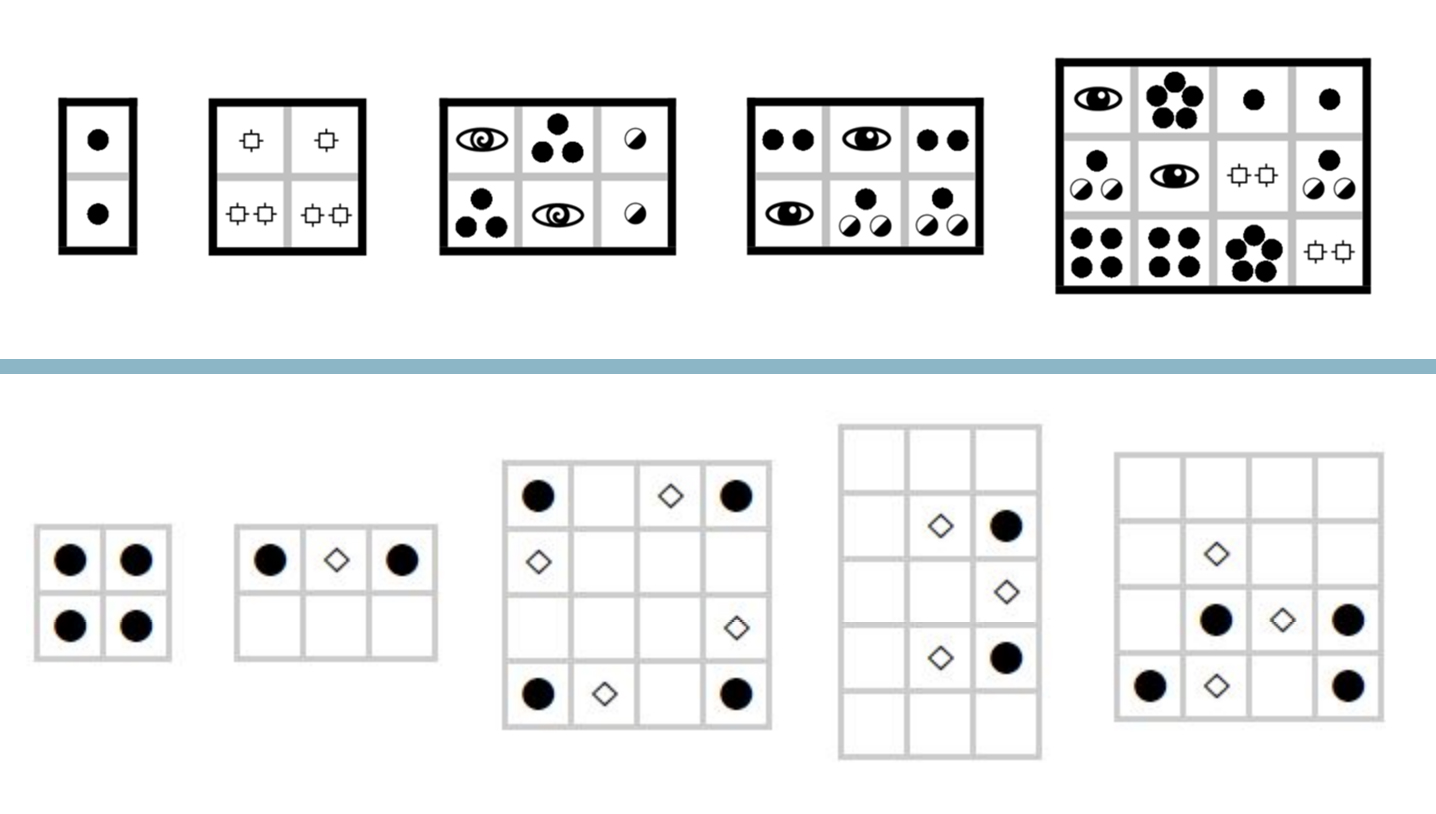
Some of "The Witless" puzzles above / "FMTC" below
Being influenced by both puzzle sets and by solving a lot of vanilla paper puzzles (my favourite genres so far have been Fillomino, Tapa, Star Battle, LITS, Statue Park, Rail Pool), my design work from LOK onwards strived to employ uniqueness as well. This is how Abdec came to be.
It's difficult to pinpoint the first moment of inspiration, but I recall being intrigued by the notion of deducing unknown shapes from thin air. This felt a lot like deducing "letters" of an alien "alphabet", so the theme was set almost at the same time as the first puzzles. In an afternoon I sketched out 10 problems, shared them in an online discussion and got my first Abdec feedback. These 10 puzzles already used most of the mechanics that are present in the final book, of course touching upon them very briefly. Similarly to LOK, I didn't think much of the system at the time, it was just a prototype as all others, another quick immersion into the creative process.
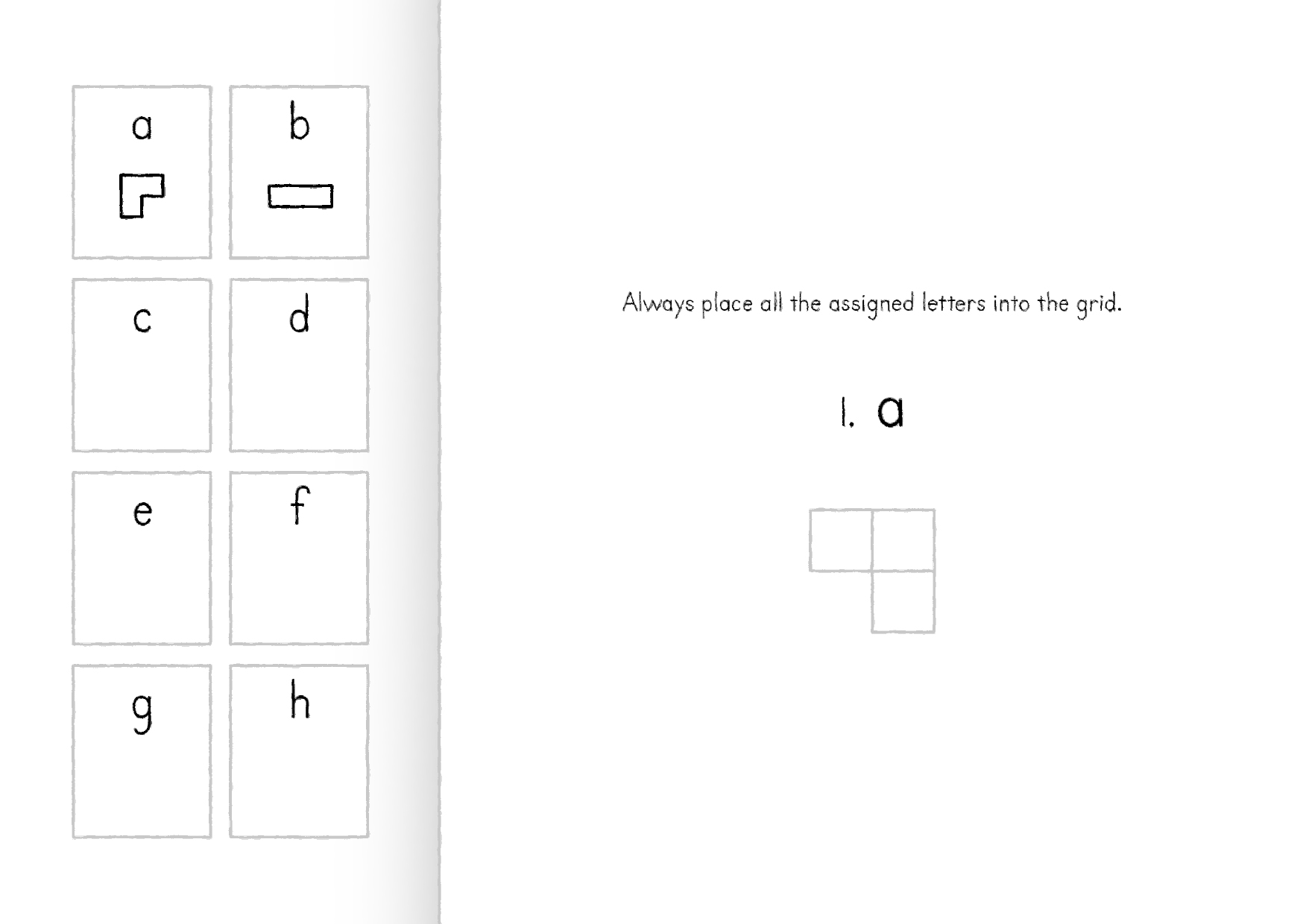
The first puzzle of the first prototype
But something urged me to return to the alien-letter idea time and time again. Abdec's development was very sporadic: I worked on it for 10 days, frantically filling up my notebooks with puzzles and seeking feedback from kind people on the internet, and then abandoned the project for a month or two; then I started the process again, and so on, for about 6 or 7 sessions through 2022 and 2023. It was clear from the get-go that Abdec won't be as pleasant and gentle as LOK, but an impenetrable, raw and uncut, elusive puzzle book. It simply came out this way, with its mechanics and visuals just following the initial inspiration - I had to accept that I was creating something that not many people could fully appreciate.
I have learned a long time ago that every art work I create, be it a puzzle book, a song, poem, film or painting, has its own identity and I either succeed in shaping it into something that feels "correct" or fail in recognising its true form. (A minor digression: I also make music for theatre and it's fascinating how soon into the process the whole band of creators, from actors to costume designers and scenographers, knows exactly what is correct for a show and what isn't. It's like the secret identity of the art work hovers above it for all to see and try to recreate.)
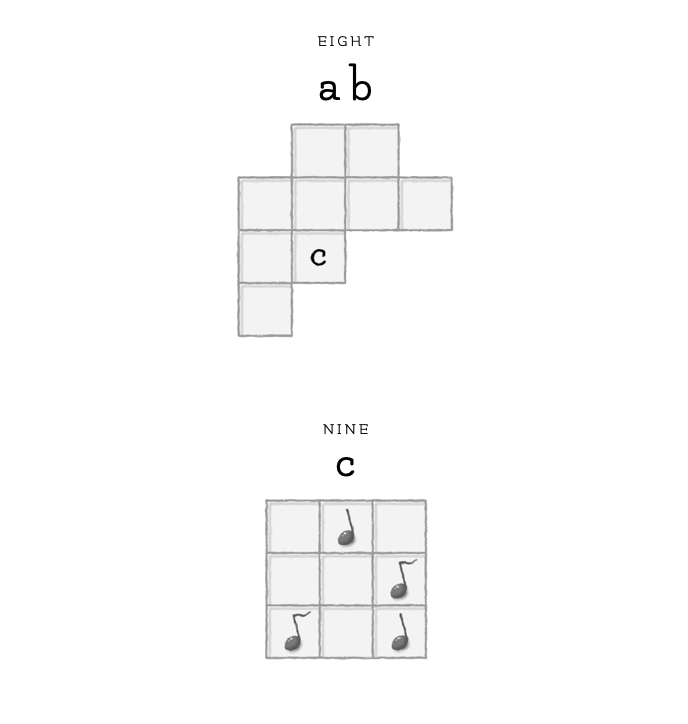
Second prototype's puzzles - it used notes instead of critters and letter "c" was swapped with "d"
The general structure of Abdec came together farily quickly, mostly based on what was already discovered in the first prototype, but I spent a lot of time refining the sequence of puzzles, trying to strike the balance between ease of learning and interesting head scratchers. If I was too trivial with introductory puzzles, to allow the player to internalise the ruleset without much difficulty, I lost their attention as soon as they got the rule, but at the same time, if the puzzles were too advanced, the solver hit a brick wall and wasn't able to even appreciate the solving path. Even today, I still think the balance could be better, but I did the best I could; with LOK, I could use text and unsolvable examples to induce understanding, but with Abdec, uniqueness of solutions was my only self-imposed tool.
I also didn't have a good end-game yet. Mechanics piled up onto each other and then the book simply stopped. I love a good finale - something that flips the whole game on its head, the ultimate reveal that shines a new light onto everything that came before. A playtester saved me in this regard - puzzle maker Deusovi played through the first set and came up with a mechanic that felt so right for the system and at the same time so cursed that I instantly fell in love with it. Without spoiling it too much, I can say it opened up the possibility space in a way that allowed me to make a really immersive and explosive end-game content, including an expansion. Thank you, Deusovi!
A great help through the development were also Sophie He, who made sure each puzzle had a unique solution (I'm not a particularly talented solver, so I regularly miss some spots even in my own puzzles!), and Hsien-Chih Chang, who immersed himself into the game to such an extent that he saw the secret identity of Abdec as clear as I did. All other playtesters also offered irreplaceable feedback: Raindrinker, Stephen Lavelle, William Hu, Martin Ender, Mark Willis, Pedro PSI, Zachary Talis, Jack Lance, Ivan Bosnić, Icely and SeptaCube. Thank you all!
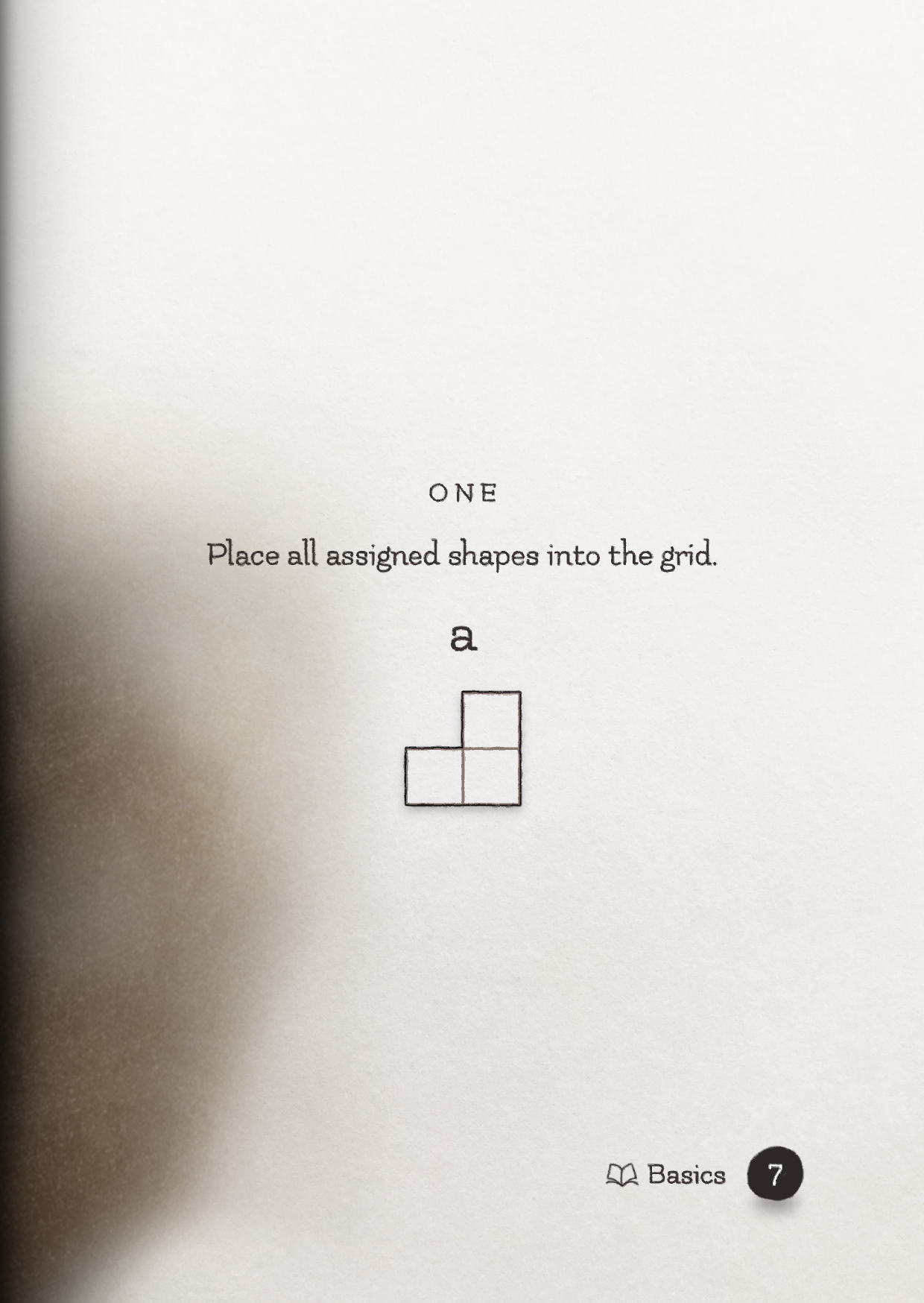
Final look
I released Abdec in its digital PDF form on Mar 21, 2023. I did it without too much flash, as opposed to how I released LOK - with LOK, I bombarded reviewers with copies, pushed on all channels I had access to, confident in its content. Abdec, on the other hand, feels like a secret to be shared among those who could truly understand it. I love it - otherwise I wouldn't release it - but I certainly am aware that it doesn't hold as much instant magic and appeal as LOK. Abdec is understated, obscure; and also offers a very personal and impactful experience, if you just give it time to reveal itself.
I never intended to publish Abdec as a physical book - honestly, I felt it wouldn't make sense financially - but based on the lovely and uplifting response I got since March, I got confident enough to start preparing it for the printers. At first, it seemed like I just needed to update some visuals and puzzles, but pretty soon I was again deep in the creative process, adding content, growing Abdec for more than 20 new puzzles. These aren't necessarily part of the main puzzle sequence, but I don't want to spoil too much, you'll see soon enough. I'm really proud of this new edition.
I will tell you more about the upcoming physical edition in the next design diary. If you wish to learn when it will be available, subscribe to my newsletter. Also, join our Letibus Discord channel, if you haven't yet!
Until next time - all the best!
Get Abdec
Abdec
The writing system of the "Abb" creatures
| Status | Released |
| Category | Physical game |
| Author | Letibus Design |
| Genre | Puzzle |
| Tags | Abstract, Art Book, Board Game, Hand-drawn, mind-bending, Mystery, Print & Play, zine |
| Languages | English |
| Accessibility | Color-blind friendly, High-contrast, Textless |
More posts
- Minor Update: Solutions (Re)AddedAug 13, 2023
- Major Update: Physical Abdec Available!Aug 04, 2023
- Design Diary 3: Burning The PagesJul 18, 2023
- Design Diary 1: It Started With A LineJul 03, 2023
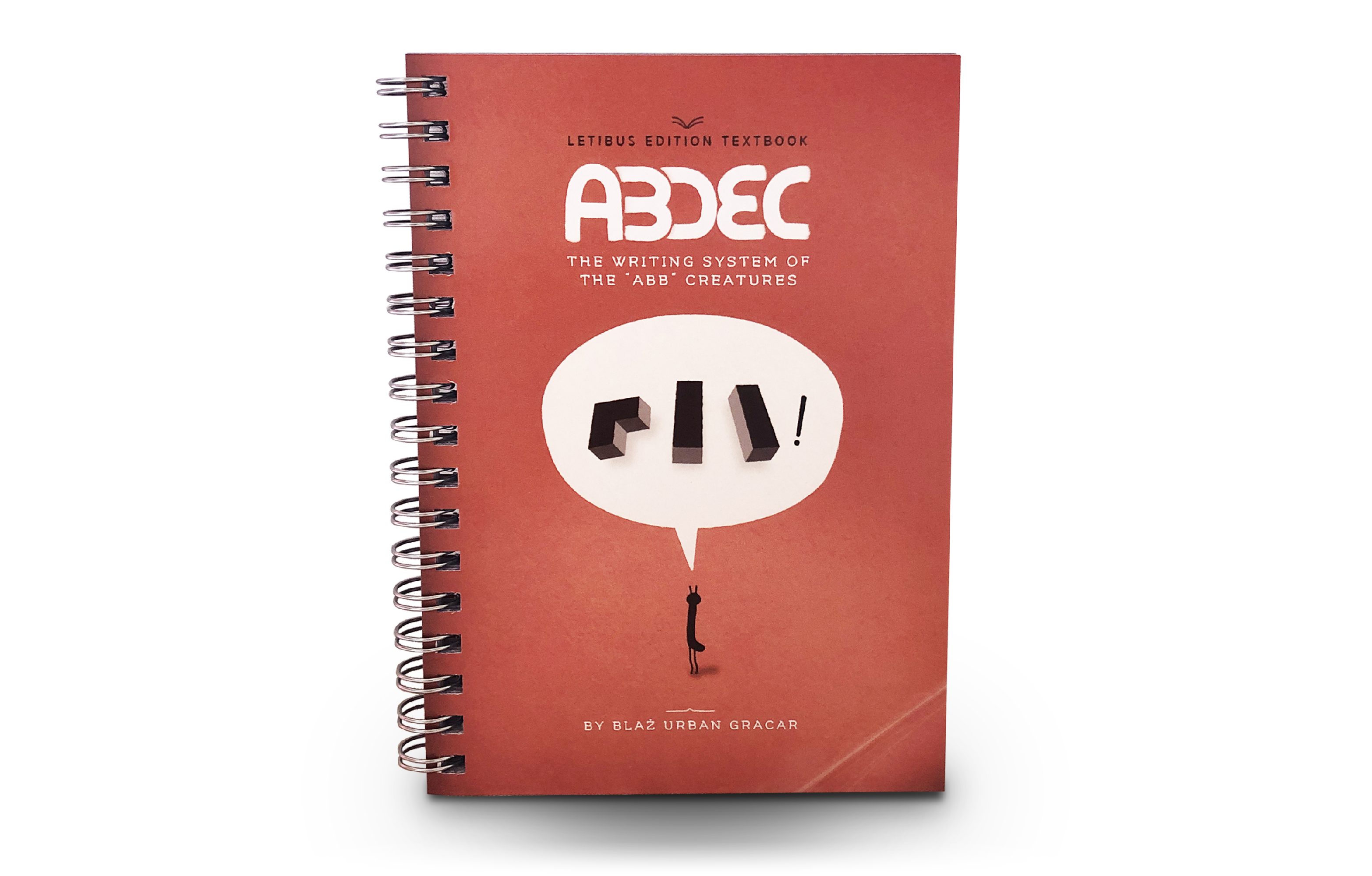
Leave a comment
Log in with itch.io to leave a comment.